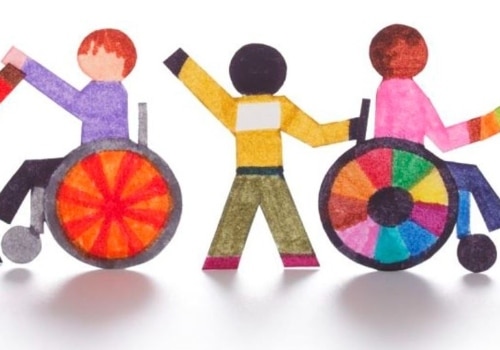Supplemental Security Income (SSI) makes monthly payments to people with low income and limited resources who are 65 or older, blind, or disabled. Your child, if younger than 18, can qualify if he or she has a physical or mental condition, or combination of conditions, that meets Social Security’s definition of disability for children and if his or her income and resources fall within the eligibility limits.
The amount of the SSI payment is different from state to state because some states add to the SSI payment. Your local Social Security office can tell you more about your state’s total SSI payment.
How does SSI work for children?
SSI rules about income and resources
The Social Security Administration (SSA) considers your child’s income and resources when deciding if your child is eligible for SSI. They also consider the income and resources of family members living in the child’s household.
These rules apply if your child lives at home. They also apply if he or she is away at school but returns home occasionally and is subject to your control. If your child’s income and resources, or those of family members living in the child’s household, are more than the amount allowed, they will deny the child’s application for SSI payments.
They limit the monthly SSI payment to $30 when a child is in a medical facility, and health insurance pays for their care.
SSI rules about disability
Your child must meet all of the following requirements to be considered disabled and, therefore, eligible for SSI:
- A child who is not blind must not be working or earning more than $1,550 a month in 2024, and a child who is blind must not be working or earning more than $2,590 (this earnings amount usually changes every year).
- The child must have a physical or mental condition, or a combination of conditions, that result in “marked and severe functional limitations.” This means the condition(s) must seriously limit your child’s activities.
- The child’s condition(s) must have been disabling, or be expected to be disabling, for at least 12 months, or the condition(s) must be expected to result in death.
Providing information about your child’s condition
When you apply for SSI payments for your child based on a disability, they will ask you for detailed information about the child’s medical condition and how it affects his or her ability to perform daily activities.
They will also ask you to permit the doctors, teachers, therapists, and other professionals who have information about your child’s condition to send it to us.
If you have any of your child’s medical or school records, please bring them with you. This will help speed up the decision-making process.
How does the SSI application process work?

The Social Security Administration will send all of the information you give them to the Disability Determination Services office in your state. Doctors and other trained staff in that state agency will review the information. They will request your child’s medical and school records and any other information needed to decide if your child meets our criteria for disability.
Suppose the state agency can’t make a disability determination using only the medical information, school records, and other facts they have. In that case, they may ask you to take your child for a medical examination or test. They will pay for the exam or test.
They may make immediate SSI payments to your child
The state agency may take three to five months to decide if your child meets their disability criteria.
However, for some medical conditions, SSI payments are made immediately and for up to six months while the state agency decides if your child has a qualifying disability.
Following are some of the conditions that may qualify:
- Total blindness
- Total deafness
- Cerebral palsy
- Down syndrome
- Muscular dystrophy
- Severe intellectual disability (child age four or older)
- Symptomatic HIV infection
- Birth weight below 2 pounds, 10 ounces – They evaluate low birth weight in infants from birth to attainment of age one and failure to thrive in infants and toddlers from birth to age 3. They use the infant’s birth weight as documented by an original or certified copy of the infant’s birth certificate or by a medical record signed by a physician.
If your child has one of the qualifying conditions, he or she will get SSI payments immediately. If the state agency ultimately decides that your child’s disability is not severe enough for SSI, you won’t have to pay back the SSI payments that your child got.
KEY TAKEAWAYS
- The SSA has employment programs that allow children to retain their SSI or SSDI payments while transitioning into the workplace.
- Your child may immediately be eligible for SSI benefits if they meet certain medical conditions.
- Children with a disability may qualify for other benefit programs like Medicaid, children’s health insurance, and other state healthcare programs.
SSI disability reviews
After your child starts receiving SSI, the law requires that they review your child’s medical condition from time to time to verify that his or her disability still meets their criteria. they must do this review:
- At least every three years for children younger than age 18 whose conditions are expected to improve and
- By age one for babies who are getting SSI payments because of their low birth weight. If they determine their medical condition isn’t expected to improve by their first birthday, they may schedule the review for a later date.
They may perform a disability review even if your child’s condition isn’t expected to improve. When they do a review, you must present evidence that your child’s disability still severely limits his or her daily activities and that your child has been receiving treatment that’s considered medically necessary for his or her medical condition.
Age Criteria
In the SSI program, a child becomes an adult at age 18, and they use different medical and nonmedical rules when deciding if an adult can get SSI disability payments.
For example, they don’t count the income and resources of family members, except for a spouse, when deciding whether an adult meets the financial limits for SSI. They count only the adult’s and spouse’s income and resources.
They also use the disability rules for adults when deciding whether an adult is disabled.
- If your child is already receiving SSI payments, they must review their medical condition when they turn 18. They usually do this review during the one-year period that begins on your child’s 18th birthday. They will use the adult disability rules to decide whether your 18-year-old is eligible for SSI.
- Even if your child wasn’t eligible for SSI before his or her 18th birthday because you and your spouse had too much income or too many resources, he or she may become eligible for SSI at age 18.
Must read articles related to Disability
- A complete guide on “How to Apply for Disability“.
- Learn more about what conditions qualify for disability.
- A complete guide on “How to Apply for SSI“.
- Discover if Social Security disability is taxable.
- Learn about how much a child can receive if a parent is on disability.
SSDI benefits for adults disabled since childhood

The Social Security Disability Insurance (SSDI) program benefits adults with disabilities that began before they turned 22.
They consider this SSDI benefit a “child’s” benefit because it’s paid on a parent’s Social Security earnings record. For a disabled adult to become entitled to this “child” benefit, one of his or her parents:
- Must be receiving Social Security retirement or disability benefits; or
- Must have died and have worked enough to qualify for Social Security
These benefits are also payable to adults who are disabled at age 18 and who received dependent benefits from a parent’s Social Security earnings record prior to age 18.
Children receiving benefits as a minor child on a parent’s Social Security record may be eligible to continue receiving benefits on that parent’s record upon reaching age 18 if he or she is disabled.
They determine disability using disability rules for adults.
SSDI disabled adult “child” benefits continue as long as the individual remains disabled. Marriage of the disabled adult “child” may affect eligibility for his benefit.
Your child doesn’t need to have worked to get these benefits.
TIP
Children who have qualified disabilities that continues into adulthood (beyond age 18), may be eligible for ongoing disability benefits.
Applying for SSI payments or SSDI benefits
You can apply for SSI payments or SSDI benefits for your child by calling Social Security toll-free at 1-800-772-1213 or using our Social Security office locator to visit an SSA office near you.
If you are applying for SSI payments for your child, you should have his or her Social Security number and birth certificate.
If you are applying for SSDI benefits for your child based on your own earnings record, please have your own Social Security number with you or the Social Security number of the retired, disabled, or deceased parent on whose record the SSDI claim is being filed, in addition to the child’s Social Security number and birth certificate. You can help the SSA make a determination by:
- Telling them as much as you can about your child’s medical condition(s);
- Giving them the dates of visits to doctors or hospitals, the patient account numbers for any doctors or hospitals, and any other information that will help us get your child’s medical records and
- Please provide them with copies of any medical reports or information you possess.
If your child is younger than 18 and applying for SSI, you must provide records showing your income and resources and those of your child. They also will ask you to describe how your child’s disability affects his or her ability to perform daily activities. In addition, they will ask for the names of teachers, daycare providers, and family members who can provide information about how your child functions. If you have school records, you should bring them to the interview.
In many communities, special arrangements have been made with medical providers, social service agencies, and schools to help us obtain the evidence needed to process your child’s claim.
However, your cooperation in obtaining records and other information will help the SSA finish its job more quickly.
Employment support programs for young people with disabilities
The Social Security Administration has many ways to encourage young people who receive SSI payments or SSDI benefits and want to go to work.
Under SSI:
- When they figure your child’s monthly SSI payment, they don’t count most of your child’s income. If your child is younger than age 22 and is a student who regularly attends school, they exclude even more of his or her earnings each month. In 2024, disabled students younger than 22 may exclude $2,290 of their monthly earnings, with an annual limit of $9,230, when counting their income for SSI. These limits may increase each year.
- With a Plan to Achieve Self-Support (PASS), a child aged 15 or older can save some income and resources to pay for education and other things needed to be able to work. They don’t count the saved income when they figure your child’s income for SSI. They don’t count the saved income and resources when they figure the amount of your child’s payment.
- Because of a medical condition(s), your child may need certain items and services to work, such as a wheelchair or a personal assistant. When figuring your child’s SSI payment, they won’t count some or all of the amount paid for these items and services in your child’s earnings.
- Your child older than age 15 may get help with rehabilitation and training.
- Medicaid coverage will continue even if your child’s earnings are high enough to stop the monthly SSI payment if the earnings are under a certain amount.
Under SSDI:
- An adult disabled before age 22 can get the same help with work expenses explained above for an SSI child and help with rehabilitation and training.
- Benefit payments may continue if you are not engaging in substantial work. For 2024, they consider you doing substantial work if your monthly earnings are over $1,550 for nonblind beneficiaries ($2,590 if you are blind).
Other Benefit Programs
Disabled children may also qualify for additional services outside of SSDI or SSI. Some of these services may include:
Medicaid and Medicare
Medicaid is a health care program for low-income people with limited resources.
In most states, children who get SSI payments qualify for Medicaid. In many states, Medicaid comes automatically with SSI eligibility. In other states, you must sign up for it.
Some children can get Medicaid coverage even if they don’t qualify for SSI. Check with your local Social Security office, your state Medicaid agency, or your state or county social services office for more information.
Medicare is a federal health insurance program for people 65 or older and those who have been receiving Social Security disability benefits for at least two years.
There are two exceptions to this rule. Your disabled adult child can get Medicare immediately if he or she:
- Has a chronic renal disease and needs a kidney transplant or maintenance dialysis or
- Has Lou Gehrig’s disease (amyotrophic lateral sclerosis).
Children’s Health Insurance Program
The Children’s Health Insurance Program enables states to provide health insurance to children from working families with incomes too high to qualify for Medicaid but too low to afford private health insurance.
The program covers prescription drugs, vision, hearing, and mental health services and is available in all 50 states and the District of Columbia. Your state Medicaid agency can provide more information about this program.
Additional healthcare services
When your child gets SSI, They will refer you to places where you can get health care services for your child. These services are under the Children with Special Health Care Needs provision of the Social Security Act. State health agencies usually manage these programs.
States call these services by many names, including Children’s Special Health Services, Children’s Medical Services, and Handicapped Children’s Program.
Most programs provide services through clinics, private offices, hospital-based outpatient and inpatient treatment centers, or community agencies.
Even if your child doesn’t get SSI, one of these programs may be able to help you. Local health departments, social service offices, or hospitals should be able to help you contact your local Children with Special Health Care Needs program.
The Bottom Line
The Social Security Administration utilizes the SSDI and SSI programs to provide benefits to children with disabilities.
The two programs have very different qualification requirements. SSI is a needs-based program for lower-income families, while SSDI typically requires a certain work history to claim benefits.
If your child qualifies for SSDI or SSI, they may also be eligible for additional benefits through Medicaid/Medicare and other state programs.
Frequently Asked Questions
Yes, your child can get a monthly payment if you receive disability benefits. They must be under 18, and stepchildren or adopted children can also qualify for the benefit. If the child is a full-time student in elementary or high school, they can continue to receive benefits until they turn 19.
The child will generally be eligible to receive 50% of the parent’s monthly benefit, although the maximum family amount is 150% to 180% of the primary insurance amount. If multiple children are involved, the dependent benefits will be split equally among the children to remain under the family maximum.
The amount your child receives depends on the amount of the parent’s monthly SSDI payment.
Your child will typically be eligible for 50% of the parent’s benefit amount. So, if you receive a disability payment each month of $1,000, your child will likely be eligible to receive $500 each month.
The numbers begin to change when multiple children are involved. Suppose you have two children in the example above. Each child would not receive $500. Instead, that benefit would be split between the children so that they each receive $250 per month.
The more children you have, the less each child will receive each month.
The payment schedules may vary slightly from one program to the next. However, you will generally get paid monthly for caring for a family member.
Remember that most Medicaid programs pay on an hourly basis. Your time must be properly logged and submitted to the program. They will usually provide payment each month based on the hours from the previous month.
Some programs might offer payments twice per month, but a monthly payment schedule is more common.
The most significant difference between SSI and SSDI is that you must have a work history to qualify for SSDI benefits. SSDI, or Social Security Disability Insurance, covers workers who have paid Social Security taxes into the system while working. If they become disabled, their benefit amount is based on their prior earnings history.
SSI benefits are available to low-income disabled individuals. No work history is required to qualify for SSI, although the average payments are much lower than SSDI payments.
The SSI program helps provide financial assistance to disabled parents who cannot work and earn money for their families. SSI can also provide payments to the children of a disabled parent to help provide financial child support to those children.
In addition, the family might also qualify for Medicare or Medicaid benefits for health insurance coverage.
The SSI program can also qualify these individuals for other important government assistance programs, such as free school lunches, a free cell phone, housing assistance, and other great benefits.
You can find a Social Security Administration office near you by using our SSA office locator and searching for your closest location.





